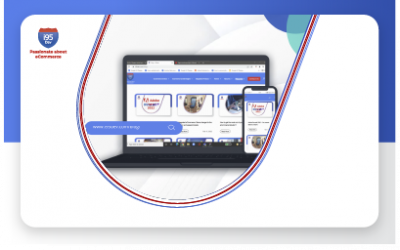Integrated B2B eCommerce for the
Food & Beverage Industry

Amongst other industries, the food and beverage industry was the slowest to react to the adoption of eCommerce. However, the year 2020 changed everything. The COVID-19 pandemic fast-tracked the digital shift for both food businesses and customers. Adapting to the unique situation, B2B business giants such as PepsiCo went digital to make the most of the online opportunities.
According to Statista, eCommerce sales will make up 18-20% of the food and beverage industry’s total sales by 2025, which is ten times more than in 2016. As a result, the US’s total revenue from food and beverage eCommerce sales is expected to cross $27 billion by 2023.
According to a research report, 64% of successful food and beverage companies have already developed an eCommerce strategy to increase their revenue generation. Of late, the food and beverage industry has witnessed the growing popularity of new business models such as Direct-to-Consumer (D2C).
Challenges faced by B2B eCommerce buyers in the food and beverage industry
According to research reports, B2B buyers in the food and beverage industry makeover 428 business-critical purchases per day. Around 44% more often than not place the order on a supplier’s eCommerce website. Close to 37% of these buyers are reported to face order errors weekly. Merely 48% of B2B buyers are returned satisfied when buying from a supplier’s website, while the other half end up disappointed as their expectations are not met.
The common challenges faced by B2B eCommerce buyers include:
- 32% find it difficult to locate relevant products
- 30% report that there are not enough product images or videos
- 28% are unable to talk to a company representative or ask a question
- 20% of buyers report errors with online orders daily
How to overcome these challenges?
The answer is simple – A fully ERP integrated eCommerce solution that:
- Delivers excellent time and data management
- Offers a seamless customer journey
- Improves customer experience
- Reduces waste and improves the quality of delivered perishable goods
How to increase speed, efficiency, and sales with an integrated B2B eCommerce solution for the food and beverage industry?
-
- Increasing speed: One of the most important aspects of eCommerce is increased speed and efficiency, with predictions indicating that more customers will purchase online if it helps them save time. Due to the short shelf life of various products in the food industry, speed has become of utmost importance. An integrated B2B eCommerce solution bridges the need for speed with the automatic creation of customer-specific order lists directly from your customer’s ERP system and the ability to generate lists on behalf of them. In addition, an integrated B2B eCommerce solution helps manage account finances, backorders, returns, acquiring copy invoices, and live account statements.
-
- Increasing efficiency: Many foods and beverage customers have multiple locations, such as a chain of restaurants. This can lead to a lot of discrepancy when placing orders. An integrated B2B eCommerce solution makes ordering easy for customers with advanced order management functionalities. With an integrated B2B eCommerce solution, one of the branches can be dedicated to managing and generating orders for multiple locations centrally. In addition, global updates can automatically be made to all locations, thereby saving a lot of time for your big clients.
-
- Simplify promotions and increase sales: It needs no mention that promotions are a key driver for attracting customers and increasing B2B sales, however, they can be extremely complex, particularly in the food and beverage industry. With the help of an integrated B2B eCommerce solution, you get the flexibility to run promotions against pricing, must-buy items, choice of reward items, and much more. Furthermore, it offers you a deep insight and analysis into the outcome of your promotions by tracking them constantly and generating detailed reports.
Why have leading food and beverage companies such as US Foods decided to opt for integrated B2B eCommerce?
- All the orders can be listed through a centralized food B2B eCommerce platform.
- All the channels to market and supply chain data can be unified on one single eCommerce platform.
- Integrated B2B eCommerce is trusted globally by leading manufacturers, wholesalers, and retailers.
Contact Us, if you are looking for an integrated B2B eCommerce solution.
Recent Blogs
Enhancing Shipping Precision with Custom Shipping Groups in Adobe Commerce/ Magento
Enhancing Shipping Precision with Custom Shipping Groups in Adobe Commerce/ Magento Author Category Share Three things matter the most when it comes to eCommerce shipping: speed, accuracy,...
Managing Massive Product Catalogs: Why Synchronization is the Key to Efficiency
Managing Massive Product Catalogs: Why Synchronization is the Key to Efficiency Author Category Share The automotive aftermarket industry is vast and highly competitive, requiring businesses...
A Complete Guide to Seamlessly Integrating Adobe Commerce with NetSuite
A Complete Guide to Seamlessly Integrating Adobe Commerce with NetSuite Author Category Share Integrating Adobe Commerce (formerly Magento) with NetSuite ERP can transform the way businesses...



